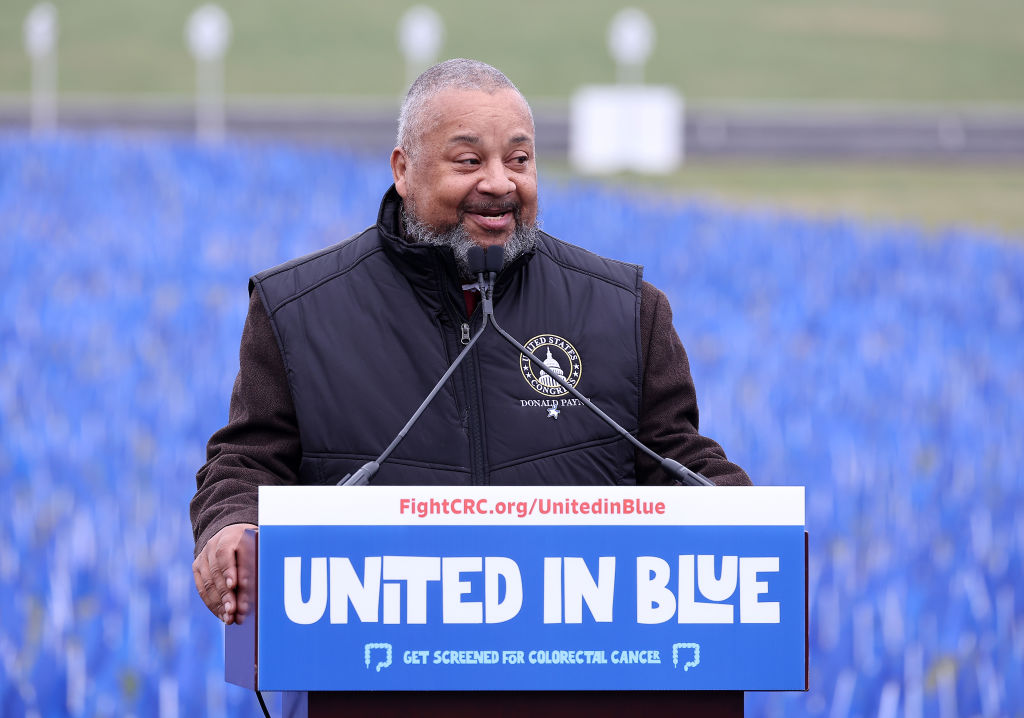After a ruling-party congress in which leader Kim Jong Un enshrined his hold on power and his commitment to developing nuclear weapons, hundreds of thousands of North Koreans celebrated with a massive civilian parade Tuesday featuring floats bearing patriotic slogans and marchers with flags and pompoms.
Kim presided over the parade and waved to the crowd. North Koreans had been practicing roles in the parade and other events for weeks, and participation is mandatory.
"We had been practicing every other day for this event," said Yun Song Hua, a 35-year-old medical student at Kim Il Sung University. "I'm proud to be able to participate in an event like this with our leader here with us."
The two-hour parade started off with a 30-minute speech by Kim Yong Nam, the head of North Korea's parliament and nominal head of state. Foreign journalists in Pyongyang for the congress had to gather hours earlier, at 5:30 a.m., to go through strict security screening. They had to surrender all telephones and communication devices, which is typical whenever Kim Jong Un is at an event with media allowed to see.
The four-day congress completed Monday was the authoritarian country's first since 1980, before Kim was even born. The rubberstamp body of more than 3,400 delegates endorsed his nuclear and economic policies, promoted his favored officials and gave him a new title of party chairman.
Kim told delegates that the North would not use its nuclear weapons unless its sovereignty is threatened and hinted that he was willing to work with countries that had previously been hostile toward the North if they are willing to work with him.
By calling a congress — something his father, Kim Jong Il, never did — Kim demonstrated what may be a leadership style more like that of his charismatic grandfather, national founder Kim Il Sung. Kim Il Sung worked through party organs more than Kim Jong Il, who preferred using his own network of trusted individuals to get things done.
U.S. & World
Victor Cha, an expert on North Korea at the Center for Strategic and International Studies who served as a top White House official on Asia policy under President George W. Bush, said that a primary goal for the congress was to anoint Kim Jong Un as leader "for the next 50 years" by naming him as party chairman.
"They are doing everything to make him look like this grandfather in every way possible with the glasses and the haircut. I think they are trying to symbolize that when his grandfather was leader, those were better days for North Korea," Cha said. "It's almost like they are trying to equate North Korea's future with North Korea's past."
Evans Revere, an expert on Northeast Asia and a former senior State Department official, said there were two main messages from the congress. The first was for Kim to demonstrate in as prominent a manner possible that "this is my party now."
Secondly, he said, the congress announced to the world that nuclear weapons are a permanent fixture in North Korea's security posture, formalizing what Pyongyang has been saying for several years, despite international demands that it adhere to its 2005 commitment in six-party talks to denuclearize.
"It's hard to take anything positive from this. The overwhelming message is that they have doubled down on the nuclear issue," he said. "I don't think the international community is going to accept that or work with that."
Revere and Cha said that North Korea's announcement it would not use those nuclear weapons unless its sovereignty was threatened appeared to be an attempt to seek legitimacy as a nuclear-armed state. In the past, the North has threatened to use nuclear weapons pre-emptively.
"The number one lesson of nuclear weapons states is that the importance of nuclear weapons is in their non-use, their deterrence, not in their use," Cha said. "Maybe they are trying to show they understand that, but I don't think they really do.
"The difficult thing for (U.S.) policymakers is, where do you go from here?" he said. "If it was ever unclear that they were not going to give up their nuclear weapons, they have made it crystal-clear that they're not going to. Can we still talk about denuclearization, or do we aim for a freeze and a cap? It's a tough situation."
Revere said a big obstacle would be taking an unpredictable regime at its word, given its failure to stick to its past commitments. Also, he said North Korea is developing what could be used as first-strike capabilities, including solid-fuel missiles, that would remove any warning time if the North intended to launch a weapon.
White House spokesman Josh Earnest said at a press briefing Monday that Washington is more focused on North Korea's actions than its words.
"Once North Korea demonstrates a commitment to coming back into compliance with those international obligations, the United States and the rest of the international community would be prepared to enter into negotiations with them and begin to give them access to the international community that they've been denied for some time now," Earnest said.
Cha said North Korea highlighted its sensitivity to criticism and ridicule through its treatment of more than 100 foreign journalists it had invited to cover the congress. Except for about 30 journalists who viewed just 10 minutes of the proceeding Monday, they were completely shut out, confined to official tours of places including a wire factory. Three BBC journalists were detained for three days and expelled because the government was unhappy with their reporting.
"It's kind of like the way they do economic reform," Cha said. "They really want it. They open up a little bit. Then they are afraid of what could go wrong, and then they close it up again. It's the way they deal with the world in general."



